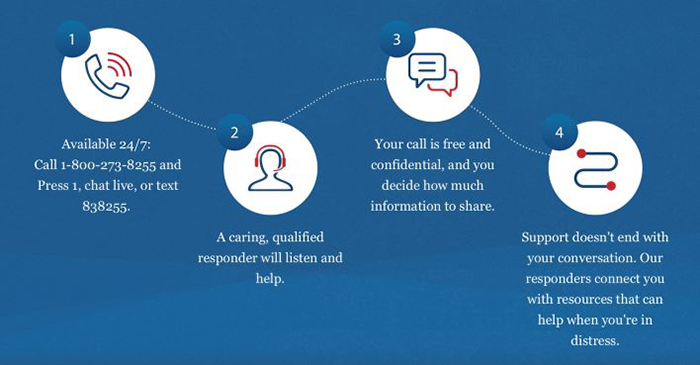 |
Veterans Crisis Line Gender Findings: Qualitative Interviews with Women VeteransHSR&D’s monthly publication Veterans’ Perspectives highlights research conducted by HSR&D and/or QUERI investigators, showcasing the importance of research for Veterans – and the importance of Veterans for research. In the November-December 2022 Issue:
|
Introduction
The Veterans Crisis Line (VCL) serves Veterans, service members, National Guard and Reserve members, and those who support them. People contacting the VCL don't have to be enrolled in VA benefits or health care to connect.
Suicide rates among Veterans have increased in recent decades. VA has implemented a variety of programs to address the suicide prevention needs of Veterans, including launching the National Suicide Prevention Hotline in 2007, which was renamed the Veterans Crisis Line (VCL) in 2010. Women Veterans represent a growing population with unique needs and experiences; prior research has found gender differences in suicide risk as well as in reasons for contacting VCL. VCL is available for support with acute suicidal crises but also to address distress or resource needs that are not acutely related to suicide risk but may be more upstream concerns that, if left unaddressed, may lead to later suicidal ideation or self-harm. VCL StudyStrengthening Suicide Prevention Efforts for Women Veterans through the Veterans Crisis Line is an HSR&D-funded study with a focus on identifying the VCL use and needs of women Veterans. This study involves examination of VCL call data, suicide-related outcomes following VCL contacts, and perspectives and recommendations of women Veterans who have contacted VCL. As part of this study, researchers conducted one-on-one in-depth interviews with 26 women Veterans who had contacted VCL in the preceding year, asking about reasons for contacting VCL, experiences with VCL contact, and recommendations for strengthening VCL services specifically for women Veterans. Interviews were conducted via telephone and, with participant consent, audio-recorded and transcribed. Study researchers then analyzed the interview transcripts to identify themes within the data. Representing all areas of the country, 42% of participants were age 55 years or older; 35% were Black/African American, 42% were white, and 23% reflected other racial identities. Twelve percent were of Hispanic ethnicity. 
FindingsInterviews with women Veterans who had experience with contacting VCL revealed several themes regarding gender-specific considerations for VCL services.
“It’s important that Veterans have that resource… they’re available 24-hours-a-day, seven days a week. And I find that it’s useful and it works. It has worked for me every time I’ve called them.” Impact and Implications
Melissa Dichter, PhD, MSW, is Principal Investigator of the Strengthening Suicide Prevention Efforts for Women Veterans through the Veterans Crisis Line study. She is part of HSR&D’s Center for Health Equity Research and Promotion (CHERP) in Philadelphia, PA.
Interviews with women Veterans who had experience with contacting VCL offered insight into their perspectives and suggestions to inform opportunities for strengthening VCL services specifically for this population. This modality of research - in-depth interviews - allows for identification of important information that is not available through analysis of other data sources. Through the interviews, Veterans are able to share their thoughts and suggestions in ways that are not limited to pre-set or close-ended questions developed by the researchers. Through the interviews, we are able to hear Veterans' voices and thoughts, in their own words, and identify themes that researchers might not have anticipated. Veterans often appreciate the opportunity to share their perspectives and experiences, providing feedback and recommendations through this interview process. By participating in interviews, VA researchers are able to identify factors important to Veterans and to use these findings to inform VA policies and programming. |